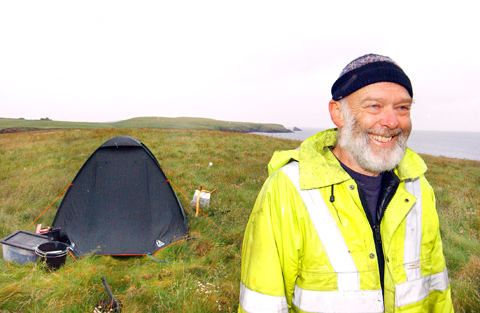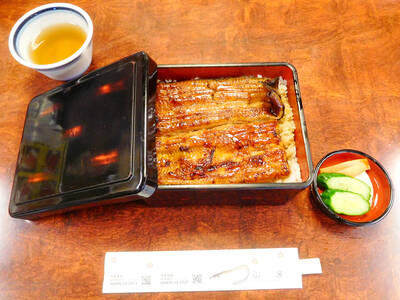A tiny isle off the coast of Britain’s northern-most island chain is to declare independence, claiming it had never been legally part of the country anyway, the Shetland News said earlier this month.
Forvik island’s only resident, Stuart Hill, said his new territory off the west coast of Shetland recognizes neither the British government nor the European Union and should become a Crown dependency.

PHOTO: AFP
In other words, the rocky, one-hectare outcrop would not be part of the United Kingdom, but run its own affairs and have no income, sales, property or corporation taxes.
The 65-year-old, known locally as “Captain Calamity” after being rescued on a doomed circumnavigation attempt of the British Isles seven years ago, also plans to issue his own currency, the Forvik gulde, stamps and a flag.
Secession could inspire Shetland’s 22,000 other residents to follow suit and have positive benefits, Hill said.
“Shetland’s relationship with the United Kingdom is based on the assumption that it is part of Scotland,” he was quoted as saying by the Internet daily from his official residence — a two-man tent. “That assumption is based on deception at the highest level and has been achieved by subterfuge and nobody can give a date on which it happened.
“By declaring Forvik a Crown dependency I am simply reestablishing the correct legal relationship between this part of Shetland and the Crown.
“By doing so I will prove that Shetland as a whole can get the same benefits and more — simply by asserting rights that already exist.”
Hill, who has published a declaration of independence, maintains that Shetland has been in constitutional limbo ever since King James III of Scotland was given the islands from King Christian of Denmark in 1469.
Shetland residents jealously guard their Viking heritage and have a closer bond with Norway than London or Edinburgh.
(AFP)
《雪特蘭新聞報》本月稍早報導指出,一座位於英國最北端群島外海的蕞爾小島將宣佈獨立;該島宣稱,於法它從來就不是英國領土的一部分。
弗維克島上唯一的居民史都華.希爾說,他這片位在雪特蘭島西部外海的新領土,既不承認英國政府,也不承認歐盟,它應該成為皇家屬地。
換句話說,這座佔地一公頃的岩石島將不再屬於英國;島上事務將自行管理,也沒有所得稅、營業稅、財產稅或企業稅。
希爾現年六十五歲,七年前進行環雪特蘭島航行失敗獲救後,便在當地得到「帶塞船長」的封號。他也計畫發行自己的貨幣「弗維克高德」、郵票,並制定國旗。
希爾表示,脫離英國的行動可能激發雪特蘭島其他兩萬兩千名居民跟進,並帶來實質的利益。
該網路報引述希爾從戶籍地─一個兩人大的帳篷發表的話說:「雪特蘭和英國的關係建立在該島是蘇格蘭一部分的假設上,而這個假設源於一場最高明的騙局,靠詭計矇混過去,反正沒人知道這段歷史切確發生的時間。」
「藉著宣佈弗維克是皇家屬地,我將重建雪特蘭群島的這個小島和皇家的正確合法關係。」
「我將藉此證明整個雪特蘭群島能獲得相同的利益,甚至更多─只要維護既存的權利。」
已發表獨立宣言的希爾堅稱,自一四六九年丹麥國王克里斯汀將雪特蘭島割讓給蘇格蘭國王詹姆士三世後,該群島在憲政上就處於不確定狀態。
島民一直謹守著他們的維京傳統;和倫敦或愛丁堡相比,他們和挪威的關連更為密切。
(法新社�翻譯:袁星塵)

Microsoft on Feb. 28 announced it was retiring Skype, the online voice and video call pioneer that the tech titan acquired in 2011. “Starting in May 2025, Skype will no longer be available,” said a post from Skype support on X, directing users to sign into Microsoft’s Teams platform for further use of its services. Skype was founded in 2003 by Scandinavians Niklas Zennstrom and Janus Friis in Estonia, revolutionizing Internet communication by offering free voice calls between computers and affordable rates for calls to landlines and mobile phones. Over the years, and as Internet speeds improved, Skype evolved to

Donburi, often simply called don, is a beloved Japanese dish that consists of a bowl of steamed rice topped with various other ingredients. The word donburi itself actually means “bowl” in Japanese, but it has come to represent much more than just a vessel. Donburi first emerged during the Edo period (1603–1867) as a quick and convenient meal for busy city dwellers. By the 19th century, donburi had become immensely popular among theater enthusiasts, who often purchased these portable meals to enjoy during long performances. Una-don, a donburi topped with grilled eel, was a particular favorite. Easy-to-carry and satisfying,

People desire a sense of purpose in their lives, but they often remain idle unless they have a clear reason to act. This concept is illustrated by the retirement paradox. People work hard to prepare for a future without work but find life meaningless after achieving that goal. A study was carried out to determine if a reason, even a minor one, could encourage idle people to take action. __1__ Upon finishing the first, they were instructed to drop it off at a location either right outside the room or at a spot farther away, which would take around

Continued from yesterday(延續自昨日) https://www.taipeitimes.com/News/lang Results showed that only 32 percent were willing to walk farther for the same candy, but 59 percent chose to do so when promised different candy. Researchers also discovered that students who walked farther reported feeling happier during the wait. __3__ Idleness aversion can be applied in various settings. For example, Uber uses animations and real-time updates to keep customers from being bored while waiting. It can also be used in the design of office buildings to reduce elevator traffic. During busy times, it takes a while to wait for an elevator. __4__ Recognizing the power